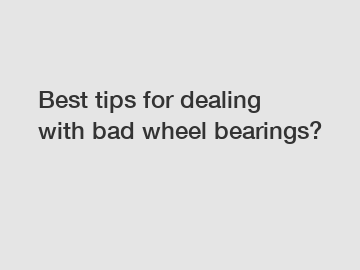Best tips for dealing with bad wheel bearings?
Wheel bearings are crucial components of a car's suspension system, supporting the weight of the vehicle while allowing the wheels to rotate smoothly. However, over time, they can wear out and cause a range of issues such as noise, vibration, and uneven tire wear. Dealing with bad wheel bearings can be frustrating, but with the right tips, you can effectively address the problem and ensure your vehicle is safe to drive.
**Signs of Bad Wheel Bearings**.
Before you can effectively deal with bad wheel bearings, you need to be able to identify the signs of a problem. Some common indicators that your wheel bearings may be failing include unusual noises such as grinding or clicking sounds coming from the wheels, vibration felt in the steering wheel, and uneven tire wear. If you notice any of these signs, it's important to address them promptly to prevent further damage to your vehicle.

**Regular Maintenance**.
One of the best ways to deal with bad wheel bearings is to prevent them from failing in the first place. Regular maintenance, including rotating your tires and checking for signs of wear on your wheel bearings, can help extend their lifespan and prevent costly repairs down the line. It's important to follow the manufacturer's recommended maintenance schedule to ensure your vehicle is properly cared for.
**Replace Wheel Bearings**.
If you determine that your wheel bearings are indeed bad, the most effective solution is to replace them. This is a job best left to a professional mechanic, as it involves removing the wheels, brakes, and other components to access the bearings. However, if you're experienced with car repairs, you can tackle this job yourself with the right tools and instructions. Be sure to use high-quality replacement bearings to ensure they have a long lifespan and provide optimal performance.
**Address Other Issues**.
In some cases, bad wheel bearings may be a symptom of other underlying issues with your vehicle. For example, worn suspension components or improper wheel alignment can put extra strain on the wheel bearings and cause them to fail prematurely. If you're experiencing frequent wheel bearing problems, it may be worth having a mechanic inspect your entire suspension system to address any potential issues.
**Drive Safely**.
While dealing with bad wheel bearings can be an inconvenience, it's important to prioritize your safety on the road. If you suspect that your wheel bearings are failing, avoid driving at high speeds or for long distances until you can have the issue addressed. Driving with bad wheel bearings can not only cause further damage to your vehicle but also put you and other drivers at risk of an accident.
In conclusion, dealing with bad wheel bearings is an essential part of maintaining your vehicle's safety and performance. By recognizing the signs of a problem, staying on top of regular maintenance, and addressing issues promptly, you can keep your car running smoothly and prevent costly repairs. If you're unsure how to handle bad wheel bearings, don't hesitate to contact a professional mechanic for assistance.
**Contact us if you need help with your wheel bearings or any other car maintenance issues.**.
For more High Performance Exhaust Manifold for MG5, High Quality Saic MG Car Headlamp, Car Front Oxygen Senso for MG ZSinformation, please contact us. We will provide professional answers.
104
0
0


Comments
All Comments (0)